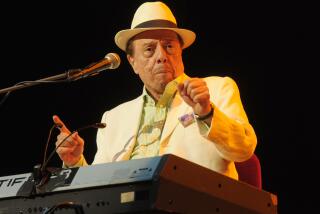Laurindo Almeida, 77; Classical, Jazz Guitarist
- Share via
Laurindo Almeida, Brazilian-born classical and jazz guitarist whose performances and compositions earned five Grammy awards and an Academy Award, and whose work can be heard in more than 800 soundtracks, has died. He was 77.
Almeida, who fused samba and jazz in the 1950s, making him the catalyst if not the creator of bossa nova, died Wednesday of cancer at Valley Presbyterian Hospital. His death was announced during the weekend by Ronald Purcell, chairman of the guitar department of Cal State Northridge’s School of the Arts.
Almeida, a naturalized U.S. citizen since 1961, had suffered from stomach cancer since 1993. Two-thirds of his stomach was removed at that time, and he later underwent radiation, interrupting but never halting his concert schedule.
Almeida’s Grammy-winning classical compositions included “Spanish Guitars of Laurindo Almeida” and “Conversations With the Guitar” both earning the awards in 1961; “Reverie for Spanish Guitars” and “Discantus” both in 1962, and “Guitar From Ipanema” in 1965. He received an additional 11 Grammy nominations throughout his career.
The guitarist won an Oscar for composing the score for the 1970 animated short “The Magic Pear Tree.” He also performed the music on that soundtrack.
Almeida wrote more than 1,000 songs and other pieces, and composed complete scores at least 10 major motion pictures, including “The Old Man and the Sea,” as well as portions of scores for hundreds of other films.
Known for his acoustical guitar work with fingers--never a pick--on nylon strings, Almeida also played electric guitar for Elvis Presley films, the mandolin for “The Godfather” and the lute for “The Ten Commandments.” Among his other film works were soundtracks for “Camelot,” “The Agony and the Ecstasy,” and “Funny Girl.”
His performances for TV theme songs included the long-running series “Wagon Train,” as well as “Rawhide” and “Bonanza.”
Almeida was featured guitarist with the Stan Kenton Orchestra in the late 1940s, made landmark recordings with alto saxophonist Bud Shank in the 1950s, was the dominant Hollywood studio guitarist in the 1950s and ‘60s, played chamber jazz with the Modern Jazz Quartet and was a founding member of the L.A. Four with Shank, Ray Brown and Shelly Manne in the 1970s.
The guitarist was born Laurindo Jose de Araujo Almeida Nobrega Neto in the village of Prainha, Brazil, near Sao Paulo, on Sept. 2, 1917. He was completely self-taught.
In 1936, working his way to Europe by playing in a cruise ship orchestra, Almeida met guitarist Django Reinhardt in Paris and found a strong jazz inspiration.
A moderately successful composer, the young Brazilian wrote “The White Clothes Village,” which was recorded by the Andrews Sisters as “Johnny Peddler” and became a hit. The royalties paid his way to America in 1947.
Almeida first worked in Hollywood on the soundtrack of “A Star Is Born” but was almost immediately invited to join Kenton. He remained with Kenton for more than three years as soloist, arranger and composer.
Combining Brazilian and American rhythms as “samba jazz” in recordings he made with Shank in the early 1950s, Almeida was credited by the late Times jazz critic Leonard Feather and others as creating the bossa nova made popular a decade later in the Getz and Charlie Byrd recording “Desafinado.”
In later years, Almeida enjoyed giving his concerts of eclectic music, often with his Canadian-born lyrical soprano wife, Deltra Eamon.
More to Read
The biggest entertainment stories
Get our big stories about Hollywood, film, television, music, arts, culture and more right in your inbox as soon as they publish.
You may occasionally receive promotional content from the Los Angeles Times.










